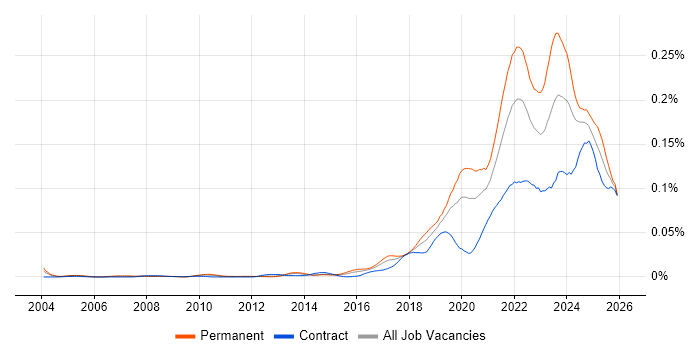Lead Data Engineer
UK
The median Lead Data Engineer salary in the UK is £95,000 per year, according to job vacancies posted during the 6 months leading to 19 May 2025.
The table below provides salary benchmarking and summary statistics, comparing them to the same period in the previous two years.
| 6 months to 19 May 2025 |
Same period 2024 | Same period 2023 | |
|---|---|---|---|
| Rank | 627 | 676 | 801 |
| Rank change year-on-year | +49 | +125 | +51 |
| Permanent jobs requiring a Lead Data Engineer | 85 | 216 | 176 |
| As % of all permanent jobs advertised in the UK | 0.15% | 0.22% | 0.18% |
| As % of the Job Titles category | 0.17% | 0.23% | 0.19% |
| Number of salaries quoted | 58 | 158 | 150 |
| 10th Percentile | £59,750 | £55,000 | £62,500 |
| 25th Percentile | £72,500 | £67,500 | £66,250 |
| Median annual salary (50th Percentile) | £95,000 | £80,000 | £85,000 |
| Median % change year-on-year | +18.75% | -5.88% | -5.56% |
| 75th Percentile | £102,410 | £97,500 | £100,000 |
| 90th Percentile | £110,000 | £110,000 | £112,500 |
| UK excluding London median annual salary | £75,000 | £75,000 | £75,000 |
| % change year-on-year | - | - | -9.09% |
All Permanent IT Job Vacancies
UK
For comparison with the information above, the following table provides summary statistics for all permanent IT job vacancies. Most job vacancies include a discernible job title that can be normalized. As such, the figures in the second row provide an indication of the number of permanent jobs in our overall sample.
| Permanent vacancies in the UK with a recognized job title | 50,683 | 94,601 | 90,752 |
| % of permanent jobs with a recognized job title | 90.72% | 94.69% | 91.52% |
| Number of salaries quoted | 27,196 | 67,610 | 57,343 |
| 10th Percentile | £29,500 | £28,500 | £32,500 |
| 25th Percentile | £41,250 | £38,500 | £45,000 |
| Median annual salary (50th Percentile) | £55,320 | £52,500 | £60,000 |
| Median % change year-on-year | +5.37% | -12.50% | - |
| 75th Percentile | £73,750 | £71,000 | £80,000 |
| 90th Percentile | £95,000 | £90,000 | £100,000 |
| UK excluding London median annual salary | £51,564 | £50,000 | £53,000 |
| % change year-on-year | +3.13% | -5.66% | +6.00% |
Lead Data Engineer
Job Vacancy Trend
Job postings that featured Lead Data Engineer in the job title as a proportion of all IT jobs advertised.

Lead Data Engineer
Salary Trend
3-month moving average salary quoted in jobs citing Lead Data Engineer.
Lead Data Engineer
Salary Histogram
Salary distribution for jobs citing Lead Data Engineer over the 6 months to 19 May 2025.
Lead Data Engineer
Top 12 Job Locations
The table below looks at the demand and provides a guide to the median salaries quoted in IT jobs citing Lead Data Engineer within the UK over the 6 months to 19 May 2025. The 'Rank Change' column provides an indication of the change in demand within each location based on the same 6 month period last year.
| Location | Rank Change on Same Period Last Year |
Matching Permanent IT Job Ads |
Median Salary Past 6 Months |
Median Salary % Change on Same Period Last Year |
Live Jobs |
|---|---|---|---|---|---|
| England | +69 | 84 | £95,000 | +18.75% | 82 |
| London | +99 | 54 | £100,000 | +11.11% | 64 |
| UK excluding London | +71 | 29 | £75,000 | - | 33 |
| Work from Home | +45 | 24 | £96,250 | +16.67% | 38 |
| North of England | -6 | 12 | £75,000 | -9.09% | 8 |
| North West | -29 | 10 | £75,000 | +3.45% | 1 |
| South East | +94 | 8 | £70,000 | -6.67% | 20 |
| South West | +95 | 6 | £98,420 | +39.45% | 1 |
| Midlands | +72 | 3 | £57,500 | -23.33% | 5 |
| Yorkshire | +53 | 2 | £54,228 | -36.20% | 3 |
| West Midlands | +44 | 2 | £60,000 | -20.00% | 4 |
| East Midlands | - | 1 | £57,500 | - |
Lead Data Engineer Skill Set
Top 30 Co-occurring Skills and Capabilities
For the 6 months to 19 May 2025, Lead Data Engineer job roles required the following skills and capabilities in order of popularity. The figures indicate the absolute number co-occurrences and as a proportion of all permanent job ads featuring Lead Data Engineer in the job title.
|
|
Lead Data Engineer Skill Set
Co-occurring Skills and Capabilities by Category
The follow tables expand on the table above by listing co-occurrences grouped by category. The same employment type, locality and period is covered with up to 20 co-occurrences shown in each of the following categories:
|
|
||||||||||||||||||||||||||||||||||||||||||||||||||||||||||||||||||||||||||||||||||||||||||||||||||||||||||||||||||||||||||||||
|
|
||||||||||||||||||||||||||||||||||||||||||||||||||||||||||||||||||||||||||||||||||||||||||||||||||||||||||||||||||||||||||||||
|
|
||||||||||||||||||||||||||||||||||||||||||||||||||||||||||||||||||||||||||||||||||||||||||||||||||||||||||||||||||||||||||||||
|
|
||||||||||||||||||||||||||||||||||||||||||||||||||||||||||||||||||||||||||||||||||||||||||||||||||||||||||||||||||||||||||||||
|
|
||||||||||||||||||||||||||||||||||||||||||||||||||||||||||||||||||||||||||||||||||||||||||||||||||||||||||||||||||||||||||||||
|
|
||||||||||||||||||||||||||||||||||||||||||||||||||||||||||||||||||||||||||||||||||||||||||||||||||||||||||||||||||||||||||||||
|
|
||||||||||||||||||||||||||||||||||||||||||||||||||||||||||||||||||||||||||||||||||||||||||||||||||||||||||||||||||||||||||||||
|
|
||||||||||||||||||||||||||||||||||||||||||||||||||||||||||||||||||||||||||||||||||||||||||||||||||||||||||||||||||||||||||||||
